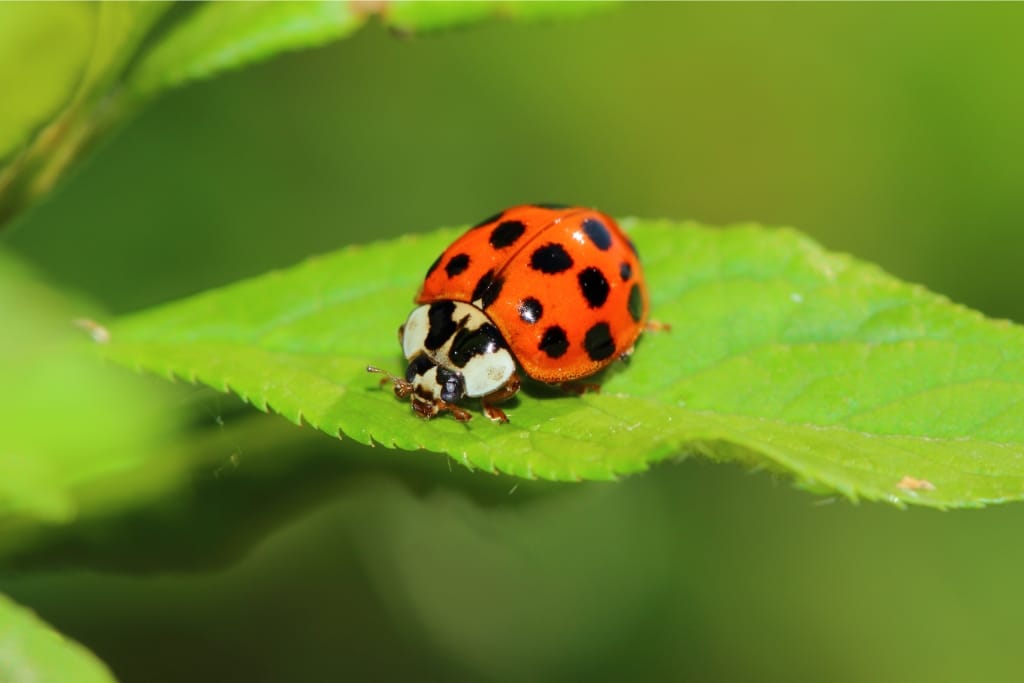Gardening should be a rewarding and peaceful activity, yet unwanted pests can often disrupt that tranquility.
Maintaining a healthy garden comes with its fair share of challenges, particularly when it comes to managing pests naturally, without resorting to harmful chemicals.
By exploring alternative methods, you can protect your plants while also ensuring a safe environment for both your family and the beneficial insects that contribute to the ecosystem.
You're about to discover some effective natural approaches to keep those pesky invaders at bay and preserve the beauty of your garden.
1)) Introduce Beneficial Insects
Harnessing the power of beneficial insects is a natural and effective way to combat garden pests.
Ladybugs, for instance, are exceptional at controlling aphid populations, while lacewings and parasitic wasps target a variety of nuisance species, including caterpillars and whiteflies.
By creating an inviting environment with flowering plants and providing shelter through mulch or stones, these helpful insects can thrive in your garden.
Encouraging their presence not only helps reduce pest numbers but also enhances biodiversity within your garden ecosystem.
Embracing beneficial insects as allies in pest control ensures your garden remains vibrant and healthy, naturally minimizing the impact of harmful invaders.
2)) Use Companion Planting
Companion planting is an age-old gardening technique that uses strategic plant pairings to naturally deter pests and promote healthy growth.
For example, planting marigolds among your vegetables can help repel nematodes, while aromatic herbs like basil and rosemary deter common insects such as mosquitoes and flies.
By selecting plants that complement each other, you can create a thriving environment where pest populations are naturally kept in check.
Incorporating companion planting into your gardening strategy not only reduces the need for chemical interventions but also fosters a harmonious and productive garden space where plants support each other's growth and health.
3)) Apply Neem Oil
Neem oil, derived from the seeds of the neem tree, is an all-natural pest repellent renowned for its effectiveness in managing a broad spectrum of garden pests.
When applied to plants, neem oil disrupts the life cycle of pests such as aphids, spider mites, and whiteflies by interfering with their feeding, breeding, and maturation processes.
It's important to apply neem oil in the early morning or late afternoon to avoid leaf burn and ensure maximum absorption.
Neem oil is safe for beneficial insects and humans, making it an environmentally-friendly alternative to synthetic pesticides.
By integrating neem oil into your garden maintenance routine, you can effectively safeguard your plants and nurture a healthy, thriving garden.
4)) Set Up Traps
Setting up traps is a practical and targeted method for reducing pest populations in your garden.
Different types of traps can be employed depending on the pests you're dealing with. For instance, sticky traps are effective for capturing flying insects like aphids and whiteflies, while beer traps can attract and drown slugs and snails.
It's important to position these traps strategically around the garden, focusing on areas where pest activity is most prevalent.
Regularly monitoring and maintaining traps ensures they remain effective and contributes to maintaining the balance in your garden's ecosystem.
By implementing a trapping strategy, you can efficiently manage pest numbers and support your garden's overall health and productivity.
5)) Make A Homemade Soap Spray
A homemade soap spray is an effective, simple, and eco-friendly solution for managing garden pests.
By combining mild liquid soap with water, you can create a spray that targets soft-bodied insects such as aphids, spider mites, and mealybugs.
The soap works by penetrating the insect's outer body, causing it to dehydrate and die.
For best results, apply the spray directly onto the insects and avoid using it during the hottest parts of the day to prevent leaf damage.
It's essential to test the solution on a small area of the plant first to ensure it is safe.
Incorporating a homemade soap spray into your pest control toolkit offers a natural alternative that is gentle on your plants and poses no threat to beneficial insects, contributing to a sustainable and flourishing garden environment.
6)) Utilize Diatomaceous Earth
Utilizing diatomaceous earth is a highly effective and organic approach to pest control in your garden.
Diatomaceous earth is a naturally occurring, soft sedimentary rock that is crumbled into a fine white powder.
This powder acts as a desiccant, damaging the exoskeletons of insects like ants, beetles, and fleas, leading to their dehydration and death.
For optimal results, sprinkle a thin layer of diatomaceous earth around the base of plants and on pathways where pest activity is observed, reapplying after rain or heavy watering to maintain its effectiveness.
It poses no harm to pets, plants, or humans when used correctly, making it a sustainable choice for environmentally-conscious gardeners.
Incorporating diatomaceous earth into your pest control practices enables you to naturally protect your plants and maintain a balanced ecosystem in your garden.
7)) Practice Crop Rotation
Practicing crop rotation is a traditional agricultural technique that enhances soil health and reduces pest-related problems naturally.
By rotating crops in a planned sequence across different sections of the garden, you prevent the buildup of pests and diseases that thrive when the same plants are grown in the same place year after year.
For instance, planting legumes in a section that previously hosted nutrient-depleting crops like corn can replenish nitrogen levels in the soil.
Crop rotation also disrupts the lifecycle of pests and breaks the chain of disease, leading to healthier yields.
This practice not only fosters balanced soil nutrition and biodiversity but also supports sustainable gardening and agricultural methods.
By embracing crop rotation, you optimize the health and productivity of your garden while minimizing the reliance on chemical fertilizers and pesticides.
8)) Implement Physical Barriers
Implementing physical barriers is a straightforward yet effective strategy for safeguarding your garden from pests.
This method involves creating protective boundaries that block pests from reaching your plants.
Options like row covers, floating nets, and garden fleece serve to either hinder the access of insects or larger creatures like birds and rodents.
For example, row covers can be placed over crops to prevent insects such as cabbage moths and beetles from laying eggs on leaves.
This technique not only shields your plants but also helps maintain a stable microclimate by moderating temperature and humidity levels.
Physical barriers offer an environmentally-friendly option that reduces the need for chemical interventions.
By integrating physical barriers into your pest management plan, you provide robust protection for your plants, helping them thrive in a healthy ecosystem.
9)) Deploy Essential Oils
Deploying essential oils in your garden is an innovative and nature-friendly method for pest management.
Essential oils such as peppermint, lavender, and tea tree work due to their strong fragrances and chemical properties that repel or even kill pests like mosquitoes, ants, and aphids.
When used correctly, they provide a targeted solution without harming beneficial insects or plants.
To apply, mix a few drops of essential oil with water and a dash of mild soap in a spray bottle, and spray directly onto affected areas or around the perimeter of the garden.
Regular application, particularly after rain, ensures that the scent barrier is maintained for optimal effectiveness.
Embracing essential oils in your pest control strategy not only deters unwanted insects but also encourages a fragrant and pleasant gardening environment.
10)) Encourage Birds In Your Garden
Encouraging birds in your garden is an excellent natural strategy for managing pests and promoting biodiversity.
Birds like sparrows, robins, and chickadees feed on a wide variety of garden pests, including insects, grubs, and even small rodents.
To attract these avian allies, provide a welcoming habitat by planting native flora that offers both food and shelter.
Installing bird feeders, baths, and nesting boxes can further enhance your garden's appeal to birds, creating a supportive environment that encourages regular visits.
By fostering a bird-friendly garden, you not only support the local ecosystem but also enjoy natural pest control and the lively presence of birdsong.
By inviting birds into your garden, you contribute to a thriving and harmonious garden ecosystem.
Conclusion
Embracing natural and sustainable practices for pest management not only preserves the health of your garden but also contributes to the greater environmental good.
Techniques such as using diatomaceous earth, crop rotation, physical barriers, essential oils, and encouraging birds create a balanced and self-sufficient ecosystem.
These methods minimize reliance on harmful chemicals, promoting both the well-being of your garden and its inhabitants.
By integrating these strategies, you cultivate a healthier, more resilient garden that thrives with vibrant life and diversity, ensuring long-term success and productivity.
Adopting these eco-friendly practices helps pave the way toward a more sustainable future, where your garden flourishes in harmony with nature.
Related Articles and Guides:
Download Our Free E-book!







